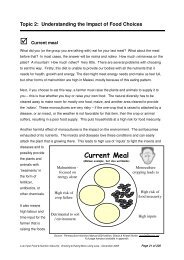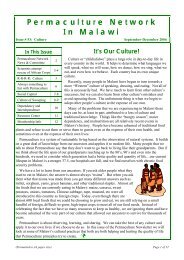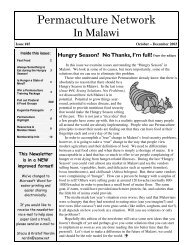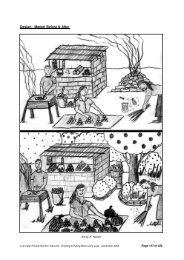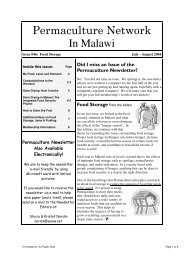Permaculture, Final Capstone Paper 5-26, Hope - Never Ending Food
Permaculture, Final Capstone Paper 5-26, Hope - Never Ending Food
Permaculture, Final Capstone Paper 5-26, Hope - Never Ending Food
Create successful ePaper yourself
Turn your PDF publications into a flip-book with our unique Google optimized e-Paper software.
Marian Zeitlin’s (1990) pioneering and extensive observations of PD behavior among<br />
Yoruba and Javanese families and their relation to children’s nutrition, reintroduced the assetsbased<br />
approach to development with a well-honed methodology. Jerry and Monique Sternin,<br />
colleagues of Zeitlin and founders of the Positive Deviance Initiative, have built upon Zeitlin’s<br />
work with their own projects in Vietnam and have since made the most influential contributions<br />
to the amplification of Positive Deviance as a tool for inquiry and development.<br />
FIGURE 2: TERMS ASSOCIATED WITH POSITIVE DEVIANCE<br />
Definition of the Positive Deviance Approach in Development:<br />
A development approach which helps a community and its members find existing, sustainable<br />
solutions to community problems today through the presence of positive deviant individuals<br />
within the community.<br />
Definition of a Positive Deviance Individual:<br />
A Positive Deviant is someone whose special practices of behaviors enable him/her to<br />
Overcome a problem more successfully than his/her neighbors who have access to the same<br />
resources or are affected by the same constraints.<br />
Definition of the Positive Deviance Inquiry:<br />
The Positive Deviance Inquiry is the tool used to discover the positive deviant's successful or<br />
desired practices.<br />
(Sternin, in Clawson, 2002, p. 3)<br />
Lapping, et al. (2002) suggests that the Positive Deviance Approach (PDA) differs from<br />
the widely employed needs-based approaches to developments which are aimed at identifying<br />
what resources communities lack. Rather, PDA is an assets-based approach that “focuses on<br />
individuals who have ‘deviated’ from conventional societal expectations and explored—though<br />
perhaps not openly—successful alternatives to cultural norms, beliefs, or perceptions in their<br />
communities” (PROWID, 1999, p. 1). Monique Sternin (in Clawson, 2002, p. 3) provides the<br />
most thorough definitions of terms associated with Positive Deviance (Fig. 2).<br />
Many whose development work has included positive deviance activities (Wishik and Van<br />
der Vynckt 1976; Cederstrom 1999; Berggen and Wray 2002; Lapping et al., 2002; Marsh,<br />
15



